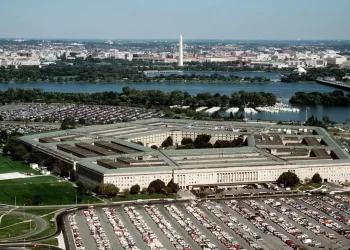PARIS (news agencies) — With the Paris Olympics less than two weeks away, a question hangs over the Games: Will the Seine River be clean enough for athletes to swim in?
Triathlon and marathon swimming are scheduled to take place in the Seine, where it has been illegal to swim for more than a century. Despite the city’s efforts to clean up the long-polluted river, the water has tested unsafe for humans in recent weeks, and cleaner on other days. The Games run from July 26-Aug. 11.
To clean up the river, Paris invested 1.4 billion euros ($1.5 billion) in building infrastructure to catch more stormwater when it rains — the same water that contains bacteria-laden wastewater that enters the river during periods of heavy rain and makes it unsafe to swim in.
In May, Paris officials inaugurated a giant underground water storage basin next to the Austerlitz train station aimed at collecting excess rainwater and stopping wastewater from entering the Seine. The basin can hold the equivalent of 20 Olympic swimming pools of dirty water that will now be treated and is the centerpiece of major infrastructure improvements that the city has rushed to finish in time for the Games, but to also ensure that Parisians have a cleaner Seine in years to come.
But a few spells of heavy rain could push E. coli levels beyond the limit of 900 colony-forming units per 100 milliliters that the World Triathlon Federation has determined as safe for competitions.
“The Seine is not a special case,” said Metin Duran, a professor of civil and environmental engineering at Villanova University who has researched stormwater management. “It really is a complicated and very costly problem.”
Paris, like many old cities around the world, has a combined sewer system, which means that the city’s wastewater and stormwater flow through the same pipes. With heavy or prolonged periods of rain, the pipes’ capacity is reached, which means raw wastewater flows into the river instead of a treatment plant.
On a daily basis, the monitoring group Eau de Paris has tested the river water, yielding results that showed unsafe E. coli levels in recent weeks followed by results in early July that showed improvement.
Paris Olympic organizers have said that if heavy rain affects the Seine’s flow during the Games, the triathlon would no longer feature the swimming portion — and the marathon swimming competition would be relocated to the Vaires-sur-Marne Nautical Stadium in the greater Paris region.
“It’s not very common, but it has happened a few times,” said Ollala Cernuda, head of communications at World Triathlon, an international body for the sport, about the possibility of the swim portion being cancelled.









 American Dollar Exchange Rate
American Dollar Exchange Rate